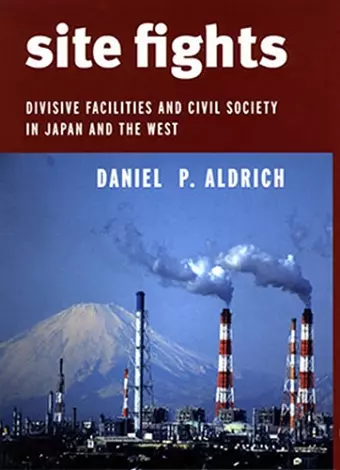Site Fights
Divisive Facilities and Civil Society in Japan and the West
Format:Hardback
Publisher:Cornell University Press
Published:15th Feb '08
Currently unavailable, and unfortunately no date known when it will be back
This hardback is available in another edition too:
- Paperback£19.99(9780801476228)

One of the most vexing problems for governments is building controversial facilities that serve the needs of all citizens but have adverse consequences for host communities. Policymakers must decide not only where to locate often unwanted projects but also what methods to use when interacting with opposition groups. In Site Fights, Daniel P. Aldrich gathers quantitative evidence from close to five hundred municipalities across Japan to show that planners deliberately seek out acquiescent and unorganized communities for such facilities in order to minimize conflict.
When protests arise over nuclear power plants, dams, and airports, agencies regularly rely on the coercive powers of the modern state, such as land expropriation and police repression. Only under pressure from civil society do policymakers move toward financial incentives and public relations campaigns. Through fieldwork and interviews with bureaucrats and activists, Aldrich illustrates these dynamics with case studies from Japan, France, and the United States. The incidents highlighted in Site Fights stress the importance of developing engaged civil society even in the absence of crisis, thereby making communities both less attractive to planners of controversial projects and more effective at resisting future threats.
Site Fights is an impressive book that pushes the reader to reconsider the role of civil society in state policymaking. It is of great interest to scholars in comparative politics and civil society research, activists, and policymakers alike.
* Japanese Journal of Political Science *Although the study is largely a chronicle of failed efforts by civil-society groups to stop public projects in their communities, Aldrich emphasizes that when civil society mobilizes broadly and strongly, it can force the state to use milder tactics and can sometimes even prevail.
-- Patricia G. Steinhoff * American Journal of Sociology *Daniel Aldrich's book should be read by anyone interested in Japanese politics in general and those who want to have a deeper understanding of the politics behind the siting of what Aldrich calls 'public bads’: facilities that impose costs directly upon a community.
-- Linda Hasunuma * Journal of Asian Studies *The popular slogan NIMBY—Not in My Back Yard—captures a classic dilemma that confronts policymakers: Although society as a whole requires certain basic public goods, such as energy supplies, improved infrastructure, and transportation hubs, individual communities are often unwilling to bear the localized costs and externalities of hosting these installations. In this fresh, insightful, and creative study, Daniel Aldrich explores the ways in which states decide to site controversial facilities and the types of instruments that public agencies employ to respond to societal opposition against these siting decisions.
-- Alexander Cooley * Perspectives on Politics *The unique contribution of this book lies in its nature as an exercise in comparative public policy. The case studies, which include Japan and France, are very well done and provide empirical evidence for the universal nature of the human reaction to siting dilemmas. They suggest that the strategic interaction between democratic state policy processes and the organizational structure of the civic society involved—including its conventions, values, and legal background—can indeed predict the success or failure of facility siting.
* Political Science Quarterly *Site Fights makes a very important contribution to both the civil society and comparative politics literatures relating to Japan. It will serve as an excellent text in a graduate-level seminar on Japanese domestic politics and should be of interest to scholars and policymakers interested in environmental issues, state-society relations, and the challenges faced by modern states in their quest to secure expanded sources of energy. Finally, citizen activists in advanced democracies would do well to take heed of one of this book's implied lessons: in order to force state compliance with democratic standards of behavior, you must gaman (persevere).
-- Patricia L. Maclachlan * Journal of Japanese StudiISBN: 9780801446191
Dimensions: 229mm x 152mm x 25mm
Weight: 907g
272 pages